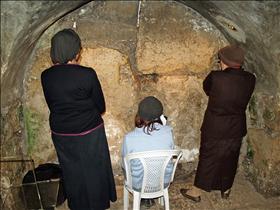Ultra-Orthodox women and men: Drastically diverging employment trends
How different are employment statistics between ultra-Orthodox women and men in Israel?
Why are more ultra-Orthodox women in Israel employed than ever before? And why are fewer ultra-Orthodox men in Israel employed than ever before? What should be done?
23/11/2014 23:30
Tags: core curriculum · haredim · haredim in the workforce · taub center · ariel sharon ·

Orthodox women praying in Western Wall tunnel
Professor Dan Ben David, executive director of the Taub Center for Social Policy Studies in Israel, wrote discouragingly that “at the end of the 1970s, when Israel’s standard of living was relatively low, education was not imperative for finding a job. In those days, rates of employment among men with all levels of education, as well as among ultra-Orthodox men, were over 80 percent. Today, in a competitive and global Israeli economy, employment rates among the uneducated are below 50 percent, as are employment rates among ultra-Orthodox men… The data reflect the increasing lack of employment opportunities that the ultra-Orthodox education system provides its sons.” (link)
In glaring contrast, the Central Bureau of Statistics announced in November that the rates of employment among ultra-Orthodox women in Israel are now higher for the first time than those of all Israeli women. Since 2000, employment of ultra-Orthodox women has shot up by nearly 30 percent, Ynet reported. Almost 80 percent of ultra-Orthodox women are employed, surpassing the overall female labor rate of 75.3 percent. Shahar Ilan, Hiddush Vice President, believes that this rise over the last decade is a result of the social security cuts implemented in 2003 during by Prime Minister Ariel Sharon.
Ultra-Orthodox politicians and rabbis are responsible for the poverty in their sector. They actively sabotage attempts by ultra-Orthodox men to seek employment.
Hanoch Verdinger, chairman of the nascent Tov political party, representing members of the ultra-Orthodox public who are integrated into the work force and Israeli society, has noted that ultra-Orthodox women must be encouraged to go to work, so as to bring the "gospel of labor" to their families and encourage ultra-Orthodox men to enter the workforce. Critical questions remain, as to whether or not more ultra-Orthodox men truly want to join the work force, and whether or not Israeli employers are truly open to hiring from among this population.
Hiddush has explored these parallel narratives, and concludes that the tremendous rise in women’s employment in the ultra-Orthodox sector suggests that cuts in child benefits and aid to yeshiva students are most effective for integrating ultra-orthodox men into the Israeli economy and society. Hiddush head Rabbi Uri Regev maintains that “It is particularly important to overcome rabbinical objection to the incorporation of ultra-Orthodox men into the workforce. Ultra-Orthodox politicians and rabbis are responsible for the poverty in their sector,” he added, claiming they actively sabotage attempts by ultra-Orthodox men to seek employment.